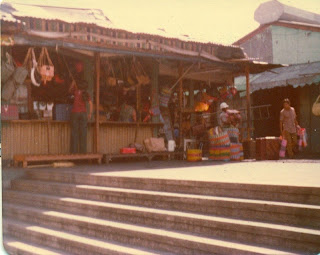Dear Mom,
The hurricane missed Costa Rica completely as far as I know. { I was wrong about this. It was in fact the remnants of hurricane Fifi that washed out the mountain road from Jacó! } Where I am here in the central highlands it probably couldn’t get to anyway because of the mountains on all sides. The first I heard about the hurricane was when someone told me his family wrote & asked him about it.
Sorry to hear about your bad luck with the calves and the garden. Even at the mountain peaks here it never really freezes! However, since October started it has been raining most of the day, every day. October is the rainiest month of the year in Costa Rica.
As you may or may not know by now, I took one roll of pictures and sent them home. I hope they arrived safely, as there should be a couple good shots if they turn out. I’m not much for taking pictures & film is very expensive here in relation to my salary so I probably won’t take a lot of pictures. I hope to get a roll of film in San Jose this weekend, and take a few more pictures before I leave Costa Rica. We leave for El Salvador on the 17th of October.
While I’m talking about leaving, here is my address in El Salvador:
Dean Jefferson, PCV
c/o United States Embassy
San Salvador
El Salvador
I heard about the big Wis. win; all the other volunteers were impressed, but were equally freaked out by the fact that Wis. still had to play Colorado, Missouri, OSU and Michigan in succession. Also heard about the loss to Colorado (a Spanish word meaning ‘red’ by the way).
You can throw away the bill from Fidelity Union. They are a ripoff insurance company which buffaloed me into signing up for a year, but the year is up on Oct. 16 and I’m not going to renew. By the way, I have $10,000 of life insurance with Peace Corps, so if I get bumped off down here, take the money and run!!
I don’t think it would be worthwhile to send the Reporter as it would cost a lot and take much longer than a normal letter to get here. I get enough of the news that interests me from your letters. On the subject of postage, don’t feel sorry for me when it cost you 42¢ to send me a letter! Costarican Colones are equal to about 11.8 American cents (8.54 Colones = 1 dollar) and there are 100 centimos in a Colon so my 85 centimos on a letter equals about 9.4¢ American! Now you know who is getting the shaft!
I think dad was smart to get his fertilizer in the fall. Chances are it will be even higher next spring. In El Salvador fertilizer prices this year are about double what they were last year and phosphorus is about impossible to get. It’s going to make fertilizer uneconomic for pasture land for the campesinos {peasant farmers}.
Of late, I’ve been reading a study of the area of the irrigation project I will work with. I’m getting so I can almost follow the idea of a book in Spanish even though I don’t know all the words. It’s a little like being in second grade again. One great thing is that technical terms and a lot of the more “intellectual” type words are very similar in the two languages. At Basico they gave us a list of 2,000 cognates (similar words with the same meaning) between English & Spanish. However, the big problem with Spanish is the verbs. Where in English we use auxiliary verbs, they change the endings and for different tenses (each in 3 persons, singular & plural)!
I went to the University library in San Jose yesterday for the morning and found two books on irrigation in El Salvador (in Español of course). I was quite impressed by the library, though it isn’t comparable with a big U.S. university. I also bought two sociology books at a book store in San Jose which is called The Book Shop and where everyone speaks English. The store has quite a selection of American paperbacks.
It sounds like Bruce is having quite a football season. I sure hope he doesn’t reinjure his ankle or his knee seriously. I always seem to find a lot of guys who have old football injuries which give them trouble at times. It sometimes makes me wonder what the purpose of a highschool football program is.
Haven’t heard a word about Tom or Carla since I left, are they alive and well or did some of your exotic parasites and diseases up there get the best of them. Only kidding of course.
There is always some new form of ailment cropping up among the volunteers here. Everything from rashes to liver ailments. There is a rash of “el gripe” (the flu) going around right now, but I haven’t got it yet. I really feel guilty about being so healthy all the time, but what can one do!
I wrote to Wash. About those 2 books I want sent down (you didn’t say if you’ve found them yet). I hope to Hades that I hear from them before I leave here! I’ll let you know when I do.
Got a letter from Jan the day before yours arrived. Getting a letter is a real event here among the volunteers so I’m happy you both have been writing, muchas gracias {thankyou}!
Hasta Luego,
Dean


























































